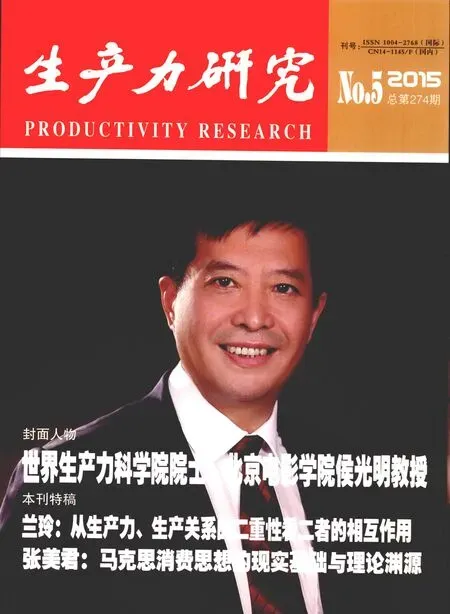馬克思消費思想的現實基礎與理論淵源
張美君
(天津社會科學院 馬克思主義研究所,天津 300191)
一、馬克思消費思想的現實基礎
“這是最好的時代,這是最壞的時代”,《雙城記》開篇第一句被無數次引用,因為這句話精辟地描繪了早期資本主義社會中驚人的矛盾。這具有諷刺意味的對比激起了馬克思對資本主義生產方式的批判和思考,在一過程中馬克思闡述了他的消費思想。
(一)這是最好的時代——社會財富飛速增長
18世紀的時候,歐洲主要資本主義國家先后經過工業革命,在經濟方面已經有了很大增長,特別是在英國,“不列顛已經達到了這樣一種創造發明的尖端;經濟地位也發展到了國民生產力和國民財富為古往今來任何國家所不能比擬的高度。”[1]從1849年8月馬克思遷居倫敦,至1883年3月馬克思逝世,這一時期,無論是英國還法國、德國等歐洲國家都處于一個迅速發展的時期,當然無可爭辯,英國是世界工業運動的先導。英國有它機器生產力的莫大積累,有它的棉紡工業,有它的煤炭工業和在機械方面無與倫比的其他十幾種工業,還有各種機器的大量出口。基本工程方面的發明幾乎清一色是英國的,偉大的鋼的發明也無一例外。英國曾經獨力創造了現代造船業,截止到1885年,在造船業幾乎沒有能與英國競爭的國家。[2]馬克思生活在倫敦,他目睹了資本主義巨大生產能力的展現,目睹了社會財富的積聚增加。在此基礎上,馬克思認為資本主義的發展為未來更加美好的社會奠定了豐厚的物質基礎。
(二)這是最壞的時代——大多數人生活悲慘
生產力增長帶來的好處,并未被社會上大多數人普遍享有。資本主義初期也是雇傭勞動階級歷史上最艱苦的時期之一。農民群眾失去土地,小生產者由于產業革命而淪為無產階級,這便在英國造成了就當時來說是很大的一批失去個人生產資料而靠出賣自己勞動力為生的人。雖然資本主義大工業正在蓬勃發展,但是從農業和家庭手工業中騰出來的勞動力,仍然超過資本主義大工業對它的需求。新的工業技術設備使廣泛使用女工和童工成為可能,因而更加削弱了工人反抗資本主義剝削的力量。英國當時沒有在產業革命所創造的新條件下保護雇傭工人利益的法律。英國的立法不承認結社的權利,認為罷工是違法的“陰謀”。對雇傭勞動的毫無限制的剝削,在18世紀和19世紀之交達到了前所未聞的地步。即使19世紀初期和中期,資本主義飛速發展,但雇傭勞動階級的貧困依舊,“工人群眾的貧困在1848年到1864年間沒有減輕,這是不容爭辯的事實,但是這個時期就工業的發展和貿易的擴大來說卻是史無前例的。”[3]
更令人發指的是對童工的剝削。馬克思在《資本論》中引用了倫敦《每日電訊》的一篇報道,“1860年1月14日,郡治安法官布羅頓先生在諾丁漢市會議廳主持的一次集會上說,從事花邊生產的那部分城市居民過著極其貧窮痛苦的生活,其困苦程度是文明世界的其他地方所沒有見過的……9歲到10歲的孩子,在大清早2、3、4點鐘就從骯臟的床上被拉起來,為了勉強糊口,不得不一直干到夜里10、11、12點鐘。他們四肢瘦弱,身軀萎縮,神態呆癡,麻木得像石頭人一樣,使人看一眼都感到不寒而栗。”[4]
雇傭勞動階級如此辛苦的工作,換來什么樣的生活呢?恩格斯詳細考察了英國城市的工人階級的生活狀況。工人被趕到這樣一些地區去,那里的建筑雜亂無章,因而通風條件比其他一切地區都要差。給他們住的是潮濕的房屋,不是下面冒水的地下室,就是上面漏雨的閣樓。為他們建造的房子不能使惡濁的空氣流通出去。給他們穿的衣服是壞的、破爛的或不結實的。給他們吃的食物是劣質的、摻假的和難消化的。工人的生活如此悲慘,以至于監獄的生活都比工人的生活略勝一籌,“在愛丁堡,竟有這樣的、出于人道的動機而把生病的窮人送到監獄里去,以便可以得到照顧和醫療。”[5]
難怪馬克思用一系列的對比控訴資本主義社會,“工人生產得越多,他能夠消費的越少;他創造價值越多,他自己越沒有價值、越低賤;工人的產品越完美,工人自己越畸形;工人創造的對象越文明,工人自己越野蠻;勞動越有力量,工人越無力;勞動越機巧,工人越愚笨,越成為自然界的奴隸。”[6]
二、馬克思消費思想的理論之源
(一)三大空想社會主義者的消費思想
歐文、傅立葉、圣西門三大空想社會主義家的思想不盡相同,但他們對于資本主義的批判、對人類幸福生活的向往和追求有著相似的地方,他們的思想對馬克思消費思想的形成有很大影響。
1.批判資本主義社會,同情無產階級的悲慘遭遇。空想社會主義家都注意到了資本主義社會中無產階級的悲慘生活,傅立葉注意到,“群眾,即貧困階級,簡直得不到財富增加后應得的份額,而只是越來越貧困。他們眼見各種各樣的財富日益增多,而自己卻無法享受。他們甚至連獲得令人厭惡的工作也沒有把握,雖然這種工作會折磨他們,除了使他們不致餓死外,不會給他們帶來任何好處。”[7]在糧食特別豐足的國家里,辛苦勞動的廣大群眾卻過著快要餓死的生活。難怪,圣西門說:“政治機體有病了,而且病入膏肓。”[8]過著優越生活的歐文、傅立葉、圣西門能夠為普通的雇傭勞動階級著想,能夠思考人類的幸福生活,他們的這種人類情懷大概也影響到了馬克思。
2.現有的生產能力足以供人們幸福生活。空想社會主義學家認為現有的生產力水平已經足夠高,只要在合理的制度安排下,所有人都能過上幸福的生活。社會弊病的根源在于對人的本性的忽視和社會制度安排不合理。歐文多次提出,“借助一些簡單而合理的措施,社會現在就能隨時掌握它所需要的一切財富,而且綽綽有余。利用百年來的發明和發現,根據科學原理組織起來的、采取簡單而合理的平等和正義原則進行管理的社會,可以在每天不到四小時的有益而愉快的勞動條件下,擁有豐裕的質地優良的產品。”[9]馬克思也曾經提出過勞動時間的節約是最大的節約,擁有更多的休閑時間是人獲得自由的保障,未來社會人們可以獲得更多的自由時間。另外,歐文和馬克思都認為機器大工業是先進的生產方式,未來社會的幸福生活就是建立在這種先進的生產方式基礎上的,“適當地應用機械力和化學力就能夠創造出極豐裕的財富,在數量上綽綽有余地滿足一切人的合理愿望,而且使生產財富的人優先得到滿足。”[10]
3.幸福生活來自物質需求和精神需求的共同滿足。空想社主義學家認為,追求幸福是人類的本性,“人類一切努力的目的在于獲得幸福。”[11]幸福的基礎首先是滿足基本生活需要,然后再有精神、發展、關系等方面需求的滿足。“一切階級的人所最需要或最必需的東西,是食品、衣服和勞動工具等,其次是家庭日用品、家具等,再次是對于人們的生存和舒適并不十分需要的東西,比如擺設品、掛鐘、懷表等。”[12]人類的幸福離不開基本消費需要的滿足,但是并不是消費的越多越好,空想社會主義學家反對人類貪婪的需要,反對人類無節制的娛樂,認為人類的消費應當適度。
4.生產與消費直接結合是未來社會的特征。空想社會主義學家提出生產與消費的分離是導致資本主義社會弊病叢生的重要原因。傅立葉設計的法郎吉是一種生產消費的聯合社,所有人根據自身特點愉快地參加勞動,法郎吉中的消費按照集體原則來組織,一切與消費直接有關的工作由相當的謝利葉來進行。歐文也有類似的思想,歐文的新和諧公社“以聯合勞動和聯合消費為原則,以農業為基礎,在公社中大家的利益是一致的和共同的。”[13]歐文也提出,取消生產與消費之間的中介環節是非常有利于人類發展的措施,“貨物不再由于反復過磅而受到損失;不會由于等待顧客而浪費時間,也不會再有市場的風險;永遠消除貨物積壓造成的損失,永遠不會因挑貨和討價還價而浪費時間;零售商因為收入直接依靠顧客而形成的那種低三下四的性格將不復存在;首先是不把人培養成力圖賤買貴賣的商人、進出口商、銀行家、學術專家和一般游手好閑分子,從而永遠不再浪費或錯用這些人的能力。”[14]
(二)古典政治經濟學和庸俗政治經濟學家的消費觀
馬克思在研究資本主義生產方式的規律時,閱讀了大量的經濟學著作,他站在無產階級的立場上,運用唯物史觀的基本原理,批判地分析了從重商主義到庸俗政治經濟學一系列人物的政治經濟學思想,其中也包括他們的消費思想。
1.贊揚消費的重商主義和重農主義。重商主義認為一國積累的金銀越多,就越富強,主張國家干預經濟生活,禁止金銀輸出,增加金銀輸入。在這種思想的指導下,他們對待消費的態度有內外之別,國內的消費要盡量的少,他們嚴厲抨擊貴族的奢侈浪費行為,主張壓低雇傭勞動階級的工資水平,這樣能減少金銀的消耗,而希望外國人的消費一定要多,這樣可以增加出口,進而增加金銀的積累。“在國內消費產品時,一個人的贏利不過是另一個人的虧損,整個國家絲毫不會變富;但在國外消費的一切東西,確實明顯的和可靠的利潤。”[15]
重農學派是18世紀50至70年代的法國資產階級的一種經濟學派。消費具有生產性,是重農主義的主要消費觀點。布阿吉爾貝爾是法國重農學派的先驅者,他認為,消費是財富的要素,一國財富的增加或減少都與消費有關,“所謂富裕,不是別的,只是大量的消費”[16],只有消費才能促進國家收入的增長,“國民收入的增長是與消費而不是與硬通貨數量的增加成正比例的”[17]。消費具有生產性的觀點到了重農學派的創始人魁奈那里表現更加明顯。魁奈認為“財富是由于他們的需要而增長的,人們所需要的生產品增加得越多,他們對產品的消費越多,他們就越富裕。”[18]非生產性消費也有作用是重農學派的另一觀點。魁奈不認為童臾與家仆、以及官吏、僧侶等人的純消費是一種社會的浪費,他認為“這些仆人對國家的益處,正像生產奢侈品的工人一樣。因為這類工人之所以有益,只是由于他們能促使有錢人花錢,并且由于他們也把勞動所得的工資花費掉。”[19]重農學派的后繼者繼續發揚消費具有生產性的觀點,以至于逐漸發展成非生產性消費也具有生產性,是社會發展不可缺少的組成部分。其中的代表性人物法國的熱·加爾涅就認為,提琴制造者、風琴制造者等人是生產勞動者,為什么提琴、風琴演奏家就不是生產勞動者呢?“這兩種人勞動的最終目的是提供同一種消費。”[20]針對加爾涅的這一庸俗觀點,馬克思反駁他說,既然如此,吃糧食的人和生產糧食的人一樣都是生產的,因為最終目的都是為了提供同一種消費——吃糧食。[21]這樣的邏輯,最后必然把非生產勞動者的消費看成是生產的源泉、生產的大小是由消費的大小來衡量。如加爾涅所說:“個人的財富由于節約而增加,相反,社會的財富則由于消費增加而增長。”[22]
2.提倡節儉的古典政治經濟學。亞當·斯密是英國古典政治經濟學的創始人,他著重論述如何有效地生產以增加社會財富,他的消費思想就蘊藏在他關于增加社會財富的論述中。斯密提倡節儉,反對國家的揮霍浪費,認為只有節儉才可以增加積累,有了積累才可以不斷擴大再生產,從而增加社會財富。“資本因節儉而增加,因浪費或行為不當而減少。”[23]“增加開支和消費,絲毫不會增加生產,也不會創造抵補這些開支的固定基金,所有從各方面來講,對社會都是有害的”。[24]斯密正確地論述了一般生產與最終消費的關系。斯密認為,“消費是一切生產的唯一目的,只是在為了促進消費者的利益時才應當去注意生產者的利益。這個原則完全事自明之理,試圖去證明它倒是荒謬的。”[25]這里所說的一切生產指的是抽象意義上的一般生產,從抽象意義上來考察,這樣說是正確的。“但是所謂一切生產的一般條件,不過是這些抽象要素,用這些要素不可能理解任何一個現實的歷史的生產階段。”[26]斯密卻這樣做了,他認為資本主義生產的最終目的也是消費,這樣生產不會過剩,生產與消費保持穩定的關系,相等或恒定。李嘉圖是大工業時期的經濟學家,他站在大資產者的立場看待消費。他認為消費是生產的附帶物,生產決定消費,消費只是被動的。為了這個目的沒有必要宣傳節約。既然資本主義生產方式是自然地和絕對的社會生產形勢,而消費是一切生產的自然目的,那么,生產的自由發展必然包括一切形式的消費的發展,因此同資本一樣,分為奢侈品的消費和其他產品的消費,是由資本主義生產的性質決定的。
3.小資產階級經濟學家西斯蒙第的消費思想。西斯蒙第是19世紀上半期的經濟學家,他目睹了資本主義第一次經濟危機的爆發,意識到了資本主義生產方式的矛盾。他站在小資產者的立場上,堅決反對為生產而生產,堅決反對將資本的增值作為生產的最終目的。西斯蒙第極為重視人的需要,強調消費的重要性,要求生產去適應消費。西斯蒙第提出了生產應當與消費平衡的思想,他覺察到這樣一種根本性的矛盾:一方面是生產力和財富的無限發展;另一方面勞動群眾只能獲得最低限度的生活必需品。因此,在他看來,生產過剩的經濟危機必然會發展,它是資本主義矛盾的必然結果。他強調生產應該與消費保持平衡。但他并沒有科學地分析這些矛盾產生的原因,也并沒有提出科學的解決措施。他寄希望于政府改良現有的經濟政策,使財富增長、人口增加、消費與生產保持合適的比例,他說:“根據事物的自然發展進程,增加一份財富就應增加一份收入,增加一份收入,就應增加一份消費,隨后是應該增加一份再生產的勞動,和增加一定的人口;最后,這種新的勞動反過來又增加財富。”[27]
4.庸俗政治經濟學家的消費思想。庸俗政治經濟學家也看到了資本主義生產與消費的矛盾,但他們不是分析這種矛盾產生的原因,而是通過各種方法回避和掩蓋這種矛盾。
方法之一,用煩瑣描繪資本主義生產與消費表象的方式掩蓋資本主義生產方式的矛盾。馬克思曾經這樣評價庸俗政治經濟學的特點,“只是在表面的聯系內兜圈子,它為了對可以說是最粗淺的現象作出似是而非的解釋,為了適應資產階級的日常需要,一再反復咀嚼科學的經濟學早就提供的材料。”[28]馬克思的這句話就非常適合用來評價讓·薩伊的消費思想。薩伊是法國資產階級庸俗經濟學的創始人,薩伊在其主要著作《政治經濟學概論》中看似詳細地論述了消費,但又覺得并沒有說出什么,他既沒有揭示出資本主義生產與消費的真正關系,也沒有揭示出雇傭勞動階級消費不足的原因,他只是在掩蓋了資本主義生產關系的前提下,泛泛地談論消費的表面現象。
方法之二,用生產一般與消費一般的關系替代資本主義社會的生產與消費關系,認為生產和消費自動平衡,以此否定資本主義社會生產與消費的矛盾。薩伊認為,“所有產品遲早總是拿來消費。其實,生產它們完全是為消費。”[29]穆勒也認為生產與消費沒有矛盾,供給與需求總是保持平衡,資本主義社會不會存在生產過剩的危機。“每年生產出來的全部東西每年消費掉;或者,一年中生產出來的東西,第二年消費掉。”[30]薩伊和穆勒用生產與消費的一般關系取代資本主義特殊的生產和消費關系,以此論證資本主義生產與消費的歷史合理性,并掩蓋資本主義生產的特殊性。
方法之三,重視消費的作用,但認為應該重視非生產者的消費。薩伊提出消費者也是生產者的觀點。“所有不靠慈善或施舍過活的人,都通過他們的勞動、資本或土地,對于生產都有一定的貢獻,所以消費者同時也可以說是生產者。”[31]薩伊的這一觀點抹殺了資本家、土地所有者和工人之間的區別,進而掩蓋了資本主義的剝削關系,也掩蓋了社會上的貧富差距。馬爾薩斯認為,在社會通常狀態下,資本家擁有足夠的收入用來消費,可是他們可能沒有消費愿望,這樣資本家的部分收入就不能轉化為消費,導致部分產品無法實現自身的價值,而工人階級生活貧困,非常希望增加消費,但是他們的收入微薄,不足以滿足自己的消費愿望,也沒有更大能力實現產品的價值,這樣資本主義社會的生產與消費不可避免地存在矛盾。調節生產與消費矛盾的辦法是增加非生產階級的消費需求,如地主、牧師、官僚等,這部分人只買不賣,能夠支付資本家的利潤,進而避免社會消費不足導致的資本主義經濟危機。
資產階級政治經濟學中各學派的消費思想代表著不同階級的利益,有著諸多不同之處,但有一個共同的特點,就是對工人消費的漠視。即使是已經認識到消費在社會再生產中具有重要作用的經濟學家,也不認為工人應該消費更多的東西。“西斯蒙第說,勞動生產力的發展使工人有可能得到越來越多的享,但這些享受如果給了工人,就使他(作為雇傭工人)不適宜于勞動了。”[32]資產階級的經濟學家把資本主義生產方式視為自然前提,不去思考資本主義生產方式本身的問題,工人生活悲慘是應該的,而馬克思卻不這樣認為,他批判資產階級經濟學家對工人作為人的漠視,批判資產階級經濟學家回避資本主義生產方式根本矛盾的研究方法。從這個意義上來講,代表各階級利益的政治經濟學家的有關理論,為馬克思確定自己研究消費的立場、方法和觀點提供了頗有啟迪的思想材料。
[1][英]克拉潘.現代英國經濟史(上卷第一分冊)[M].北京:商務印書館,2009:6.
[2][英]克拉潘.現代英國經濟史(中卷)[M].北京:商務印書館,2009:159.
[3]馬克思,恩格斯.馬克思恩格斯文集(第3卷)[M].北京:人民出版社,2009:3.
[4][28]馬克思,恩格斯.馬克思恩格斯文集(第5卷)[M].北京:人民出版社,2009:282,99.
[5][英]克拉潘.現代英國經濟史(上卷第二分冊)[M].北京:商務印書館,2009:725.
[6]馬克思,恩格斯.馬克思恩格斯文集(第1卷)[M].北京:人民出版社,2009:158.
[7]傅立葉.傅立葉選集(第 1卷)[M].北京:商務印書館,2009:144.
[8]圣西門.圣西門選集(第 1卷)[M].北京:商務印書館,2009:243.
[9][10][12][14]歐文.歐文選集(第 2卷)[M].北京:商務印書館,2009:11,80,201,32.
[11][13]歐文.歐文選集(第 1卷)[M].北京:商務印書館,2009:223.
[15][20][21][22][24][32]馬克思,恩格斯.馬克思恩格斯全集(第33卷)[M].北京:人民出版社,2004:165,222,222,327,318,343.
[16][17]布阿吉爾貝爾.布阿吉爾貝爾選集[M].北京:商務印書館,2009:297,52.
[18][19]魁奈.魁奈經濟著作選集[M].北京:商務印書館,2009:111,182.
[23][英]亞當·斯密.國富論(上卷)[M].西安:陜西人民出版社,2001:378.
[25][英]亞當·斯密.國富論(下卷)[M].西安:陜西人民出版社,2001:725.
[26]馬克思,恩格斯.馬克思恩格斯文集(第8卷)[M].北京:人民出版社,2009:12.
[27][瑞士]西斯蒙第.政治經濟學新原理[M].北京:商務印書館,2009:430-431.
[29][31][法]薩伊.政治經濟學概論[M].北京:商務印書館,2009:480-481,483.
[30][英]詹姆斯·穆勒.政治經濟學要義[M].北京:商務印書館,2012:124.

